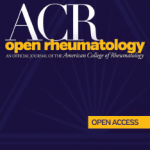Editor-in-Chief Andras Perl, MD, PhD, anticipates broader scope & greater impact in the journal’s future
ACR Open Rheumatology (ACROR) is the newest of the ACR’s three peer-reviewed journals, publishing its first issue in March 2019. Since its introduction, the journal has provided high-quality articles, reporting on original investigations in all aspects of rheumatology-related research (e.g., basic science, clinical science, epidemiology, health outcomes and education), as well as reviews and commentaries in the field of rheumatology and related disciplines to clinicians, scientists, researchers and practitioners throughout the U.S. and around the world, doing so in an open-access format.
Open access is a key component, according to Andras Perl, MD, PhD, who became ACROR’s editor in chief in January 2024. He is the distinguished professor of medicine and chief of the Division of Rheumatology & Clinical Immunology at Upstate Medical University, Syracuse, New York, as well as a professor of biochemistry and molecular biology, and microbiology and immunology.

Dr. Perl
“The other ACR journals—the flagship journal Arthritis & Rheumatology, which has been around for many years, and Arthritis Care & Research—are available only to people who are subscribers [including ACR and ARP members] or who have access to subscribing libraries. But with ACROR, everyone has access to it without a subscription or library affiliation. That includes rheumatologists in private practice, general practitioners who care for rheumatology patients or the patients themselves across the globe,” said Dr. Perl.
With a year as editor in chief under his belt, Dr. Perl sat down with The Rheumatologist (TR) to discuss his approach to ACROR, including his push to broaden the range of articles and increase the journal’s impact.
TR: Let’s start with your background, which includes earning your MD and PhD from Semmelweis Medical University in Budapest, Hungary, doing your fellowship in rheumatology at the University of Rochester Medical Center, New York, and now holding positions at Upstate Medical University.
Why did you decide to travel to North America, and how does your background play into your role as ACROR’s editor in chief?
Dr. Perl: I originally came to the U.S. to pursue research. At that time, there were many more opportunities and resources in the U.S. to learn about advancements in this field, so I applied for and got a three-year fellowship at the University of Rochester.
After I completed [my fellowship] in 1992, I actually went back to Hungary, but the political system was undergoing substantial change. And after just five months, I decided the U.S. was a better option for continuing my research career at that time.



